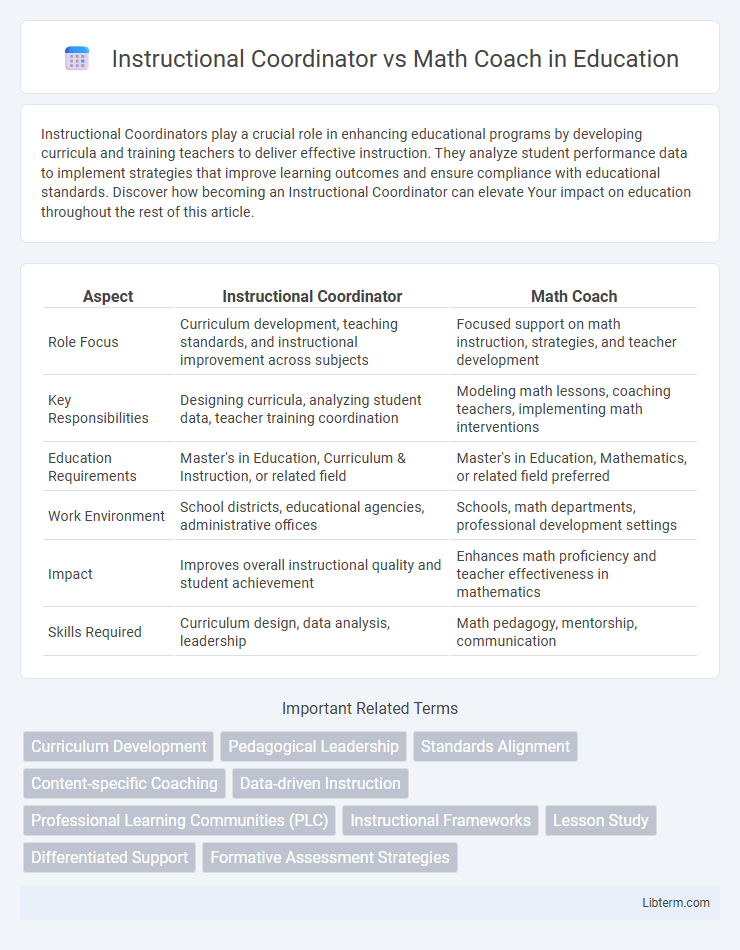Instructional Coordinators play a crucial role in enhancing educational programs by developing curricula and training teachers to deliver effective instruction. They analyze student performance data to implement strategies that improve learning outcomes and ensure compliance with educational standards. Discover how becoming an Instructional Coordinator can elevate Your impact on education throughout the rest of this article.
Table of Comparison
| Aspect | Instructional Coordinator | Math Coach |
|---|---|---|
| Role Focus | Curriculum development, teaching standards, and instructional improvement across subjects | Focused support on math instruction, strategies, and teacher development |
| Key Responsibilities | Designing curricula, analyzing student data, teacher training coordination | Modeling math lessons, coaching teachers, implementing math interventions |
| Education Requirements | Master's in Education, Curriculum & Instruction, or related field | Master's in Education, Mathematics, or related field preferred |
| Work Environment | School districts, educational agencies, administrative offices | Schools, math departments, professional development settings |
| Impact | Improves overall instructional quality and student achievement | Enhances math proficiency and teacher effectiveness in mathematics |
| Skills Required | Curriculum design, data analysis, leadership | Math pedagogy, mentorship, communication |
Overview: Instructional Coordinator vs Math Coach
Instructional Coordinators develop and implement curricula, analyze student performance data, and train educators across various subjects to improve instructional quality. Math Coaches specialize in supporting teachers specifically in mathematics through targeted coaching, modeling lessons, and providing content-specific strategies to enhance student achievement in math. Both roles aim to elevate teaching effectiveness but differ in scope, with Instructional Coordinators overseeing broader educational programs and Math Coaches focusing exclusively on math instruction.
Core Roles and Responsibilities
Instructional Coordinators primarily design and implement curriculum, analyze student performance data, and train teachers to improve overall instructional quality across subjects. Math Coaches focus specifically on enhancing math instruction by providing targeted professional development, modeling effective teaching strategies, and supporting teachers in addressing student math challenges. Both roles emphasize improving educational outcomes but differ in subject specialization and scope of instructional support.
Required Qualifications and Credentials
Instructional Coordinators typically require a master's degree in education or curriculum and instruction, along with state certification as an educational specialist or administrator, and several years of teaching experience. Math Coaches usually hold a bachelor's or master's degree in mathematics education or a related field, often paired with teaching certification and demonstrated expertise in math instruction and coaching strategies. Both roles benefit from professional development in leadership and instructional methods, but Instructional Coordinators emphasize curriculum design credentials while Math Coaches focus on specialized math pedagogy credentials.
Skills and Competencies Needed
Instructional Coordinators require strong skills in curriculum development, data analysis, and teacher training to effectively implement educational programs and assess student performance metrics. Math Coaches must possess deep content knowledge in mathematics, exceptional communication abilities, and expertise in differentiated instruction to support teachers in improving math instruction and student outcomes. Both roles demand leadership, collaboration, and problem-solving competencies, but Instructional Coordinators lean more towards administrative and strategic planning skills, while Math Coaches focus on hands-on classroom support and pedagogical strategies.
Key Differences in Daily Tasks
Instructional Coordinators primarily develop curriculum standards, analyze teaching effectiveness, and provide professional development for educators across multiple subjects, while Math Coaches concentrate specifically on enhancing math instruction through hands-on classroom support and targeted teacher mentoring. Instructional Coordinators analyze school-wide data to inform instructional strategies and ensure compliance with educational policies, whereas Math Coaches focus on interpreting math assessment results to improve student understanding and engagement in mathematics. The daily tasks of Instructional Coordinators emphasize broad curriculum design and teacher training sessions, contrasting with Math Coaches' emphasis on collaborative lesson planning and individualized teacher feedback in math classrooms.
Impact on Student Achievement
Instructional Coordinators directly influence student achievement by designing and implementing curricula that align with educational standards, ensuring effective teaching strategies are utilized schoolwide. Math Coaches specifically enhance student outcomes by providing targeted professional development and modeling best practices in mathematics instruction, leading to improved conceptual understanding and higher test scores. Both roles collaborate with teachers to analyze student performance data, refining instructional methods that support academic growth in diverse learning environments.
Collaboration With Teachers and Staff
Instructional Coordinators collaborate with teachers and staff by analyzing curriculum effectiveness and providing professional development to align instructional strategies with school goals. Math Coaches work directly with teachers to model lessons, offer targeted feedback, and co-plan instruction to improve student outcomes in mathematics. Both roles prioritize ongoing communication and teamwork to enhance instructional quality and support staff growth.
Professional Development Duties
Instructional Coordinators design, implement, and evaluate professional development programs tailored to curriculum standards and district goals, ensuring teachers enhance instructional strategies across subjects. Math Coaches concentrate on providing specialized professional development focused on mathematics pedagogy, curriculum alignment, and data-driven instructional improvements to boost student achievement in math. Both roles collaborate with educators but differ in scope, with Instructional Coordinators overseeing broad educational initiatives and Math Coaches targeting subject-specific skill advancement.
Career Growth and Advancement Paths
Instructional Coordinators often advance into leadership roles such as curriculum directors or educational administrators, leveraging their expertise in curriculum development and staff training to influence school-wide instructional strategies. Math Coaches typically progress by becoming lead coaches, district specialists, or pursuing roles in educational consulting, focusing on math instruction improvement and teacher mentorship. Both paths offer opportunities for career growth by expanding influence from classroom-level support to broader educational impact within schools or districts.
Choosing the Right Role for Your School
Instructional Coordinators specialize in developing curricula and instructional materials to enhance overall teaching effectiveness across subjects, while Math Coaches focus exclusively on improving math instruction through targeted support and professional development. Selecting the right role depends on your school's specific needs: if boosting math achievement is a priority, a Math Coach provides tailored expertise; for broader curriculum alignment and instructional improvements, an Instructional Coordinator is ideal. Evaluating factors such as instructional goals, teacher support requirements, and resource availability ensures the chosen role maximizes educational outcomes.
Instructional Coordinator Infographic

 libterm.com
libterm.com